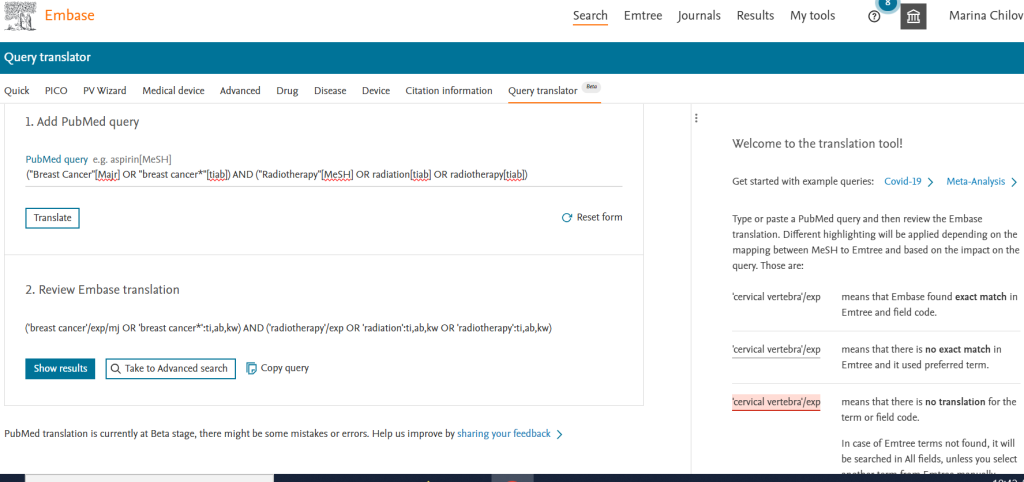When conducting a literature search on a topic, many times the search is conducted in more than one database for more comprehensive results. And in the case of systematic reviews, such a practice is required.
Even more challenging, when it comes to systematic reviews, is that the searches in each database should be as similar to one another as possible. The process of taking an original search strategy from one database and making only necessary changes (controlled vocabulary, syntax, field codes), adapt the strategy to another database is referred to as “search translation.”
The Parts of a Search
There are several parts to complex literature searches that combine multiple elements: Boolean operators, nesting, controlled vocabulary, field codes, quotations, proximity, and special operators.
Boolean Operators
Boolean Operators (AND, OR, and NOT) are the basis of how to combine concepts to create a search.
While nearly all databases use Boolean operators in the same manner and meaning, it’s important to know when capitalization is necessary and when it is not.
Nesting
Nesting uses parentheses much in the same way they are used in Algebra — that is, whatever is inside the pair of parentheses must be done first, and from there a search (just like math), will be conducted from left-to-right.
Since nesting is about how to read and execute a search, it typically will not change between databases.
Controlled Vocabulary
Controlled vocabulary refers to the set dictionary of terms for that database, such as MeSH (Medical Subject Headings) and EmTree. MeSH is the National Library of Medicine’s controlled vocabulary, and they create the MeSH terms for PubMed. These terms may not always be identical to the MeSH terms found in MEDLINE on another platform though, and they require different identification.
Unfortunately there is no easy way to translate these terms, but using the built in databases (MeSH Database, MEDLINE Term Finder, EmTree Database, etc) you can quickly find the most closely aligned term to use.
Field Codes
Field codes are essentially the special codes for each database that tell the database where to search for that term. For example [tiab] in PubMed tells the database to search that term in the title and abstract fields only. In MEDLINE the title/abstract field code is .ti,ab, whereas in Embase it is :ti,ab.
Quotations
In order to search for a specific phrase searches must use quotations. However, depending on the database, they may require double quotations (“smart quotes”), straight quotations, or single quotations.
Proximity
Proximity operators (also called adjacency in some databases) are essentially a middle-ground between searching across an entire record and specific quotations. They allow the user to select how close they want to two terms to appear in a record. Every database uses slightly different proximity operators and syntax, and some have strict rules with how they can be used.
Special Operators
Special Operators are operators that can be added to search terms to modify what is searched. Examples of special operators are truncation and wildcards, which expand the variations of the specified term that are searched. An asterisk (*) is the common operator for truncation in many databases.
Where to Start
All the information on how to search each database according to its own rules and/or the rules of an online platform it resides on can be found in the database/platform’s Help section.
Typically, this translation of search strategies is done by a librarian manually but automated/semi-automated tools are being gradually introduced. A beta version of such tool (Query Translation) is currently available in Embase.com, the Elsevier interface of the Embase database. It will assist in “translating” PubMed searches into the Embase.com search syntax.

The tool allows entering a search term or the whole search strategy (query) and get it translated to Embase syntax.

 The library now subscribes to the 5th edition of
The library now subscribes to the 5th edition of  The Library now subscribes to the journal
The Library now subscribes to the journal